Lowell Week in Review: December 4, 2016
City Council News
There was no council meeting last week. It was cancelled because the preceding Friday, the day the meeting agenda is finalized and shared, was the day following Thanksgiving, and between the holiday and related early closures of city hall, it was unlikely that a productive meeting agenda could be formulated. I believe that the council has also cancelled its meetings for December 27, 2016 and January 3, 2017, which are the Tuesdays following Christmas and New Years. (Both of those holidays fall on Sundays this year, so the official holiday is on Monday, so government offices will be closed on Monday, December 26, and on Monday, January 2).
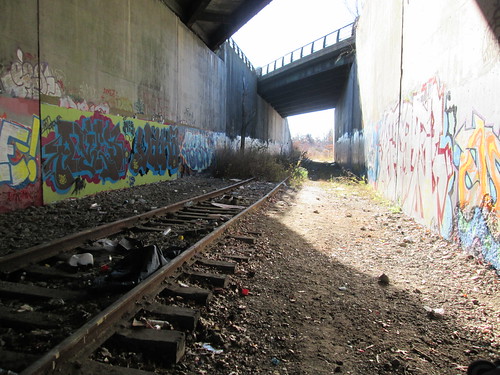
Abandon rail line that forms future River Meadow Brook Trail
River Meadow Brook Trail
This coming Tuesday’s council meeting agenda has a couple of important/interesting items. Under “unfinished business,” the council will revisit the petition of Gervais Auto Group to rezone a portion of the adjacent railroad track which it intends to purchase from Pan Am Railways in order to expand its car dealership. Because that stretch of track had long been considered a key portion of the envisioned River Meadow Brook Trail which would connect the Bruce Freeman Trail with the Concord River Greenway, trail advocates hoped that the future use of the parcel by Gervais might include an easement for the trail, something Gervais said was not feasible.
At its November 15, 2016 meeting, the majority of a divided council voted to delay action on the rezoning request to the December 6, 2016 meeting to give City Manager Kevin Murphy an opportunity to ask the adjoining property owner if it was inclined to grant a similar easement that would extend the trail. Although Manager Murphy days later reported that the neighboring owner was not amenable to granting such an easement, the Lowell Sun’s Chris Scott, in a November 29, 2016 blog post reported that the neighboring property owner, AVCarb (formerly Avco), now seems more open to such an arrangement after meeting at the site with Jane Calvin of the Lowell Parks and Conservation Trust and Eric Slagle of the city.
Hopefully this by-pass agreement can be consummated because a functioning River Meadow Brook Trail is an important part of the city’s future, not just as a recreational amenity, but as an alternate transportation link connecting Cross Point and everything around it, that portion of the upper Highlands, and our western suburbs of Chelmsford and Westford, to a protected-from-cars walking and biking route to the Gallagher Terminal and the Hamilton Canal District.
This episode also provides a lesson to those of us who believe trails like this are critical to the future of Lowell. Thanks mostly to the Lowell Parks and Conservation Trust, the plans for these and other trails exist, but awareness of the potential of such trails among the broader public—and the city’s elected officials—is lacking. Without stronger public buy-in of such plans, even those years away from becoming reality, the ultimate creation of these future trails will always be jeopardized any time a property owner wants to do something adverse to the future of the trail. Witness the comments made by some councilors back at the November 15 council meeting that clearly demonstrated that in a conflict between the short-term benefit of an established business and the potential long-term benefit of the broader community, the business is likely to prevail.
Building strong current support for such plans, even if they are still years away from accomplishment, might level the playing field in future conflicts like this one.
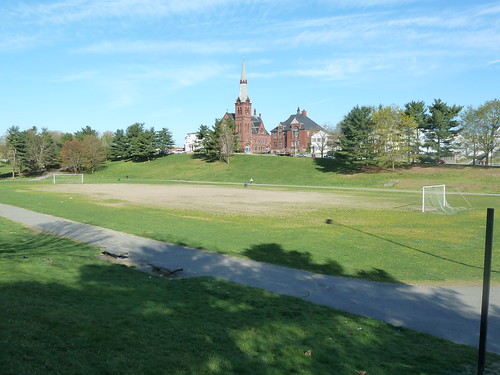
South Common
Lighting the South Common
Speaking of playing fields, Councilor Dan Rourke has a motion on this Tuesday’s council agenda asking “the proper department install new lights at South Common Park.” The South Common is a valuable civic resource that is underutilized. One of the reasons that is so is that the playing field within the Common’s sloped bowl is in sad shape. True, the city spread grass seed on it last year, but not much of the new seed sprouted. Still, athletic teams have played on dirt field before and they will play on them again. But they can’t play in the dark so if the city is able to light up the field, it could become a hot spot for evening football and soccer games.
Not far back in our city’s history, athletic and civic events at the South Common routinely drew thousands of people to that public green space. With development of the Hamilton Canal District proceeding and with the rapid pace of construction at the Thorndike Exchange development across the street, the South Common has huge potential again. This year, let’s light up the South Common; then let’s start talking about a year-round turf field and related amenities.
Minimum Residential Factor
The council will address the following letter from the city manager on Tuesday night:
I am requesting that the City Council hold a public hearing on Tuesday, December 13, 2016, for the purpose of voting on the Minimum Residential Factor that will allow the Board of Assessors, Chief Financial Officer, and City Auditor to submit the fiscal year 2017 tax rate to the Department of Revenue for approval.
Last year, the public hearing on the Minimum Residential Factor was held on December 15, 2015. Here’s what I wrote about it at the time:
Public hearing on establishment of the “minimum residential factor.” This is the percentage of the tax levy that is allocated to residential property. Manager Murphy begins by reviewing the financial accomplishments of this council. Foremost is its support of education; the city exceeds the amount required for “net school spending.” He also explains that by using greater than expected new growth, the city has been able to minimize the increase. He says the average home has increased in value by $12,000 which means the average tax bill for a single family home will increase by $119. Some tax increases will be higher; some will be lower, based on varying values. He points out that properties representing 25% of overall city real estate value do not pay any real estate taxes. He closes by saying that the Lowell increase is one of the lowest in the region. No member of the public speaks, either for or against. No debate from the council. Passes unanimously.
One thing that drew some comments last year was the “properties representing 25% of overall city real estate value do not pay any real estate taxes” line in the above report. This 25 percent would include property owned by the city and the state (which would include UMass Lowell and Middlesex Community College) as well as non-profits that are exempt from paying real estate taxes such as Lowell General Hospital, CTI, various houses of worship, and others (some of which make “payments in lieu of taxes”).
So while the minimum residential factor will just be a formality this week, the public hearing on December 13, particularly the city manager’s presentation on the city’s finances, should be interesting.
UMass Lowell and Haverhill
The property-owning entity that doesn’t pay property taxes to Lowell that creates the most angst for some city councilors is UMass Lowell. Many times in the past I’ve made the case that such criticism of UMass Lowell is short-sighted because of all of the other economic benefits that accrue to the city because of the presence of UMass Lowell in Lowell.
A University press release issued this week tells us that our down-river neighbor of Haverhill will soon play host to an expanded UMass Lowell presence. Here’s the release:
UMass Lowell unveils plans for new Haverhill satellite campus
Business incubator, expanded academic programs to open this fall
LOWELL, Mass. – UMass Lowell today announced detailed plans for the new location of its Haverhill satellite campus, including expanded academic programs and a new business incubator to serve the region.
UMass Lowell will open the permanent site for its Haverhill campus – 22,000 square feet over two floors of the newly constructed Harbor Place – for the fall 2017 semester. The multi-tenant building is located in the heart of the city’s downtown, offering ease of access to local businesses, highways and public transportation and the commuter rail.
UMass Lowell Chancellor Jacquie Moloney and state Rep. Brian Dempsey of Haverhill made the announcement at an event at Harbor Place with Haverhill Mayor James Fiorentini and representatives of the building’s development team, state and local government, the Greater Haverhill Foundation and the university.
“UMass Lowell’s satellite campus at Harbor Place will allow the university to deliver its high-quality programs in a location that is even more convenient for those who live and work in the Greater Haverhill area,” said Moloney. “This new location will also help the university expand on the partnerships we have built in this community and forge new relationships that will enable us to be even more responsive to the needs of local employers and entrepreneurs.”
“By locating its satellite campus at Harbor Place, UMass Lowell will play a crucial role in the transformation of downtown Haverhill and to the overall economic health of the region,” said Dempsey. “As a UMass Lowell graduate, I know the tremendous value that education brings to individuals and employers, as well as the strength of the university’s commitment to the community.”
UMass Lowell’s annual positive economic impact on the region is more than $921 million, according to research by the UMass Donahue Institute, up from $490 million in 2010. UMass Lowell is one of only 14 public institutions in the nation designated as an Innovation and Economic Prosperity University by the Association of Public and Land-Grant Universities (APLU).
While the downtown location has been under construction, UMass Lowell’s Haverhill satellite campus has been operating at Northern Essex Community College and offering undergraduate courses and degree programs in subjects including business, criminal justice and psychology.
With the move to Harbor Place, the university will continue to offer those programs with expanded options and academic services and will launch a new executive education program for mid-level and senior managers. All of the academic programs will be under the auspices of UMass Lowell’s award-winning Division of Online and Continuing Education.
UMass Lowell’s new business incubator will be based on the model of the successful Innovation Hub that it operates in downtown Lowell. It will provide technology startups with a range of services including co-working and private office space and a prototype makerspace for research and development of new products, as well as access to the expertise of UMass Lowell faculty and state-of-the-art research facilities. The site will also make flexible meeting and conference space available to the community and businesses.
In conjunction with the incubator and its academic programs in Haverhill, the university will explore a special MBA option for Haverhill that would allow students to complete experiential education with Innovation Hub companies.
“The Innovation Hub at Harbor Place will foster innovation, entrepreneurship, economic development and job creation by linking the region’s technology startups and entrepreneurs to resources that facilitate the development, manufacturing and commercialization of their respective innovations,” said Moloney.
So congratulations to Haverhill for landing this new UMass Lowell business incubator and all the new businesses and jobs that will come with it. Selfishly, I’m sorry the expansion couldn’t have been in Lowell. We could always use new businesses and new jobs, but at lease there won’t be any complaints about lost property taxes. That “burden” will belong to Haverhill.
Lowell Justice Center
As the following photographs show, work on the Justice Center is progressing quickly. The green stockade fence that now encloses the job site makes it tough to see what is going on inside, but you can catch a glimpse from a few elevated vantage points in the vicinity.
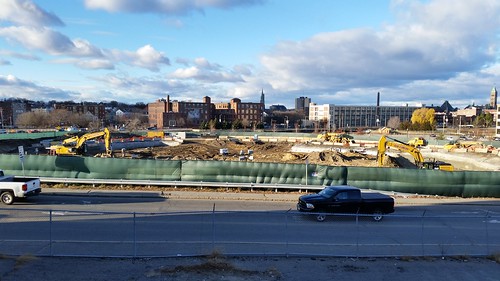
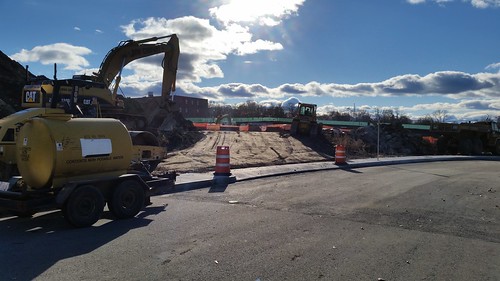
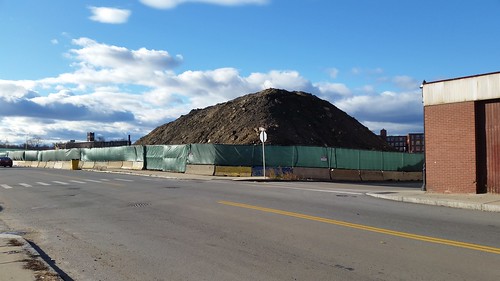
Important Civic Meetings This Week
There are a couple of important civic meetings this week. Unfortunately, two of them fall on the same night:
Lord Overpass/Western Ave – Dianne Nichols Tradd, the Assistant City Manager/Director of DPD, along with city transportation planners, will make a presentation on the Lord Overpass and Western Ave at the A-Mill Loading Dock at Western Avenue Studios on Thursday, December 8, 2016 from 6:30 pm to 8 pm. Everyone is invited.
Lowell High School – At 6:30 p.m. on Thursday, December 8, 2016, architects and consultants on the Lowell High School renovation/addition/replacement project will give a public presentation on their findings to date at the high school’s Irish Auditorium. Everyone is invited.
Election 2016 – A Community Conversation – Next Saturday, December 10, 2016, from 9:30 a.m. to 11:30 a.m., the Pollard Memorial Library will host a community conversation about the 2016 presidential election. Here’s what the library’s website says about the event:
As we move past one the most divisive presidential elections in modern US history, now is a good opportunity to reaffirm our commonalities as Americans and begin the work of bridging what divides us. It is in that spirit, especially as an institution dedicated to equal access to information and education, the Pollard Library is hosting a non-partisan, civil and constructive community conversation on the 2016 Election and its impact on America. We hope you’ll join local educators, community organizers, and fellow citizens on Saturday, December 10th at 9:30am. Everyone Welcome. Coffee and light refreshments served.
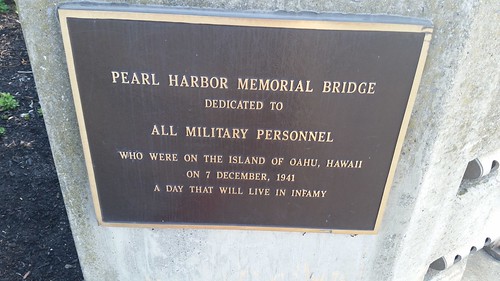
Pearl Harbor Memorial Bridge carries East Merrimack Street over Concord River in front of Lowell Memorial Auditorium
Pearl Harbor Day
Wednesday, December 7, 2016 is the 75th anniversary of the Japanese attack on Pearl Harbor, the event which brought the United States into World War Two. This Wednesday, the Greater Lowell Veterans Council will hold its annual Pearl Harbor remembrance ceremony at 10 a.m. at the Lowell Memorial Auditorium Hall of Flags. Everyone is invited.
What makes the RIver Meadow Brook trail vote so important is that it links population centers to downtown Lowell. Recreation trails like the Riverwalk are great but they don’t transform how people get around so get less use and in turn are underappreciated.
This trail, once completed, will reduce the need for people to drive into Lowell, helping with congestion. Updating abandoned rail trails for alternate transportation is a lot easier than carving out space for protected bike lanes on our streets.
Trails that connect where people live to where they work, study, and play are what journalists, keynote speakers, and politicians cite when explaining how once tired cities experience long sought after success. This really should be an easy vote.
It is important to put the amount of non-taxable property into context. We would not be a city that has so much commercial property, and so much multifamily residential property filling our municipal coffers if not for the institutions that occupy that property.
That doesn’t mean we have to be Uncle Sucker to every school and non-prof that wants some land, but it’s important that we not fall into the trap of looking at each individual parcel’s tax payments in isolation. A city like Lowell is an interconnected system, and we need to think about topics like taxes and development in terms of promoting a healthy system.
So, for instance, we should consider the River Meadow Brook parcel and the potential fiscal bonanza of having it used for car surface storage (ahem, ahem, ahem) not just in terms of the taxes that property would produce, but also by looking at the benefits of a connected rail trail to downtown and what that would mean for the affected neighborhoods’ development.
Didn’t the city use South Common to store snow two years ago. I remember the massive snow piles at the Hamilton Canal. I also remember hearing about reseeding areas where snow had been stored. Perhaps all the salt has leached into the soil. I know that I frequently have a ten foot dead zone along the sidewalk here on Pine Street come summertime. It sometimes looks like someone poured bleach on the ground.
The state has a nice document on the environmental impact from treating roads in winter. The document was released in 2012, but I am sure that it is still relevant:
https://www.massdot.state.ma.us/Portals/8/docs/environmental/EnvironStatus_PlanningRpt_0212.pdf
There is a good reason that the state has to get a waiver to dump snow in wetland areas. Israel is trying to create crops that grow in conditions of high salinity. Maybe the city can find different types of grass that will grow well in similar conditions here.